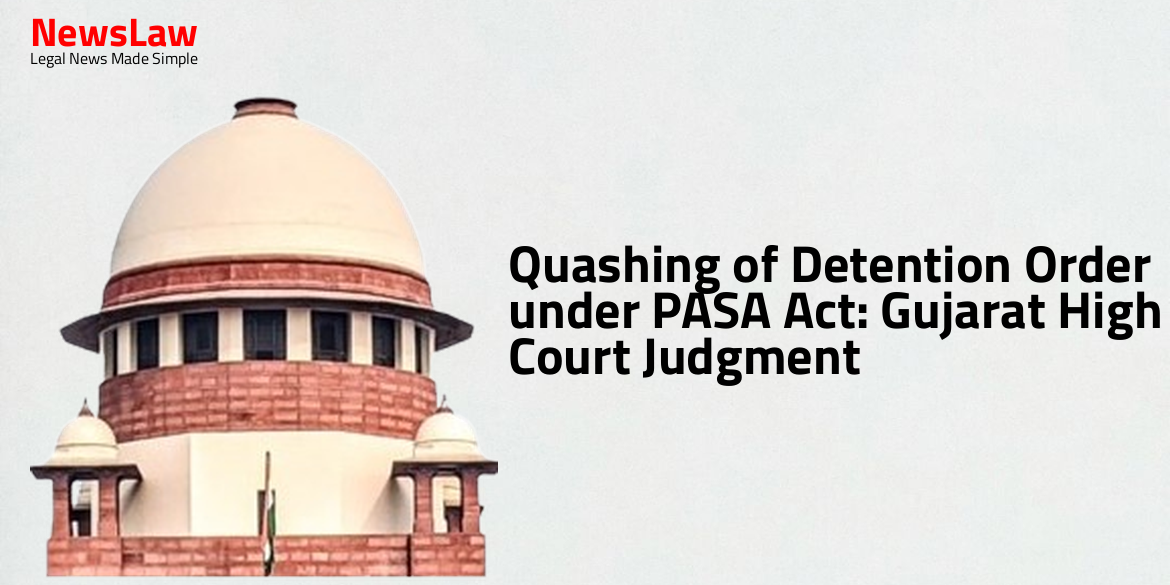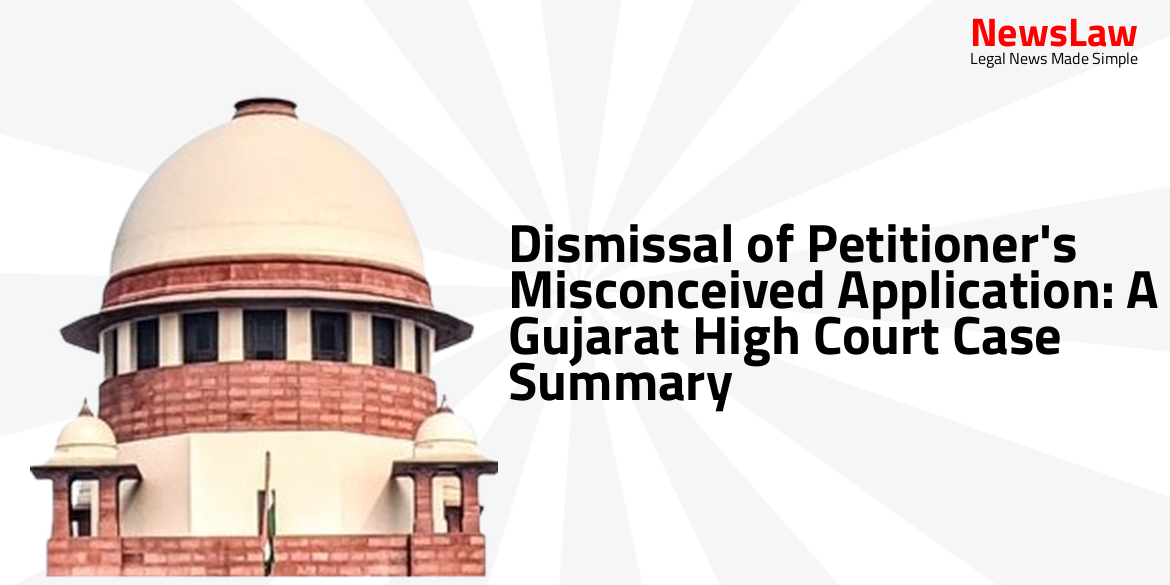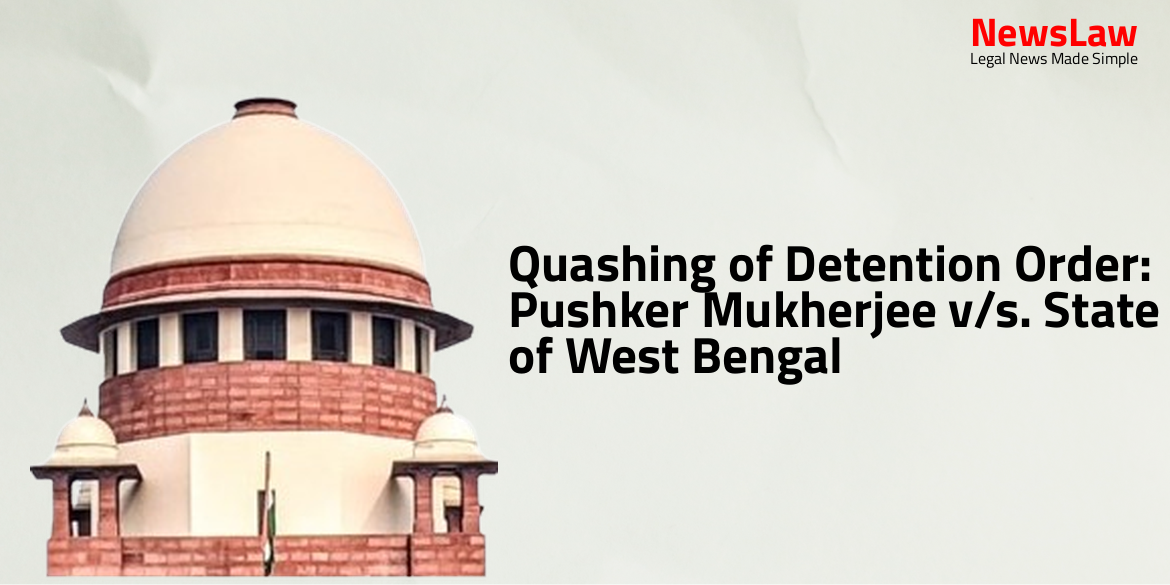In a recent judgment, the Gujarat High Court has ruled on the quashing of the detention order under the Gujarat Prevention of Anti-Social Activities Act, 1985. The case involved the detenue challenging the order issued by the detaining authority. The Court’s decision sheds light on the proper application of preventive detention laws and the necessity of maintaining a balance between individual liberty and public order. This case sets a precedent for future interpretations of detention orders under the Act.
Facts
- Present petition challenges the order of detention dated 19.01.2024 by the detaining authority.
- The detention was carried out under Section 3(1) of the Gujarat Prevention of Anti-Social Activities Act, 1985.
- The petitioner has been detained as per the definition under Section 2(c) of the Act.
Arguments
- The petitioner’s advocate argues that apart from witness statements and FIR registration, there is no additional evidence to show that the petitioner’s alleged activities constitute a breach of public order.
- It is contended that the petitioner being on bail in all offenses indicates that his activities did not disrupt the social fabric to the extent of threatening public order.
- The detaining authority is criticized for basing the detention order solely on the registration of three FIRs without considering the impact on public order.
- The advocate asserts that the alleged illegal activities are related to law and order rather than public order.
- AGP for the respondent-State supported the detention order passed by the detaining authority.
- Sufficient materials and evidences were found during the investigation and supplied to the petitioner-detainee.
- Detainee is involved in activities as defined under Section 2(c) of the Act.
- Detaining authority rightfully passed the order of detention based on the facts of the case.
Analysis
- The detaining authority’s subjective satisfaction is found to be not legal and in accordance with the law.
- The offenses alleged in the FIRs do not impact public order as required by the Act, and other penal laws are sufficient to address the situation.
- The allegations against the detenue are not relevant to bring them under the definition of Section 2(c) of the Act.
- There is a lack of material to establish that the detenue poses a threat to society or disturbs public order at a level necessitating detention under the Act.
- The detention orders should align with the constitutional safeguards of Articles 21 and 22 of the Constitution of India.
- No reference in the order to any State application for cancellation of bail filed against the detenue.
- The detention orders have historical roots in the colonial era and must be applied judiciously with strict adherence to constitutional rights.
- The expression ‘public order’ does not encompass every kind of disorder but only some categories thereof.
- Acts of assault or injury to specific persons do not necessarily lead to public disorder.
- Disturbances that affect public order must impact the community or the public at large.
- The contravention of any law always affects order, but before it can be considered to affect public order, it must affect the community or the public at large.
- Detention orders should not be based on minor breaches of peace of local significance but should primarily address actions that directly affect the community or public interest.
- Preventive detention involves detaining individuals without trial to prevent them from committing specific offenses, but it should not replace ordinary law enforcement or absolve investigating authorities of their duties.
- Recourse to preventive detention should not be favored over ordinary criminal laws when addressing offenses that can be dealt with through regular legal processes.
- The powers of preventive detention are exceptional and should be used cautiously and judiciously.
- The distinction between ‘law and order’ and ‘public order’ has been clearly established by the courts, emphasizing that not every breach of peace leads to public disorder.
- Overuse and incorrect application of preventive detention laws have been noted by the courts, leading to numerous orders being quashed.
- Article 22 must be read as an exception to Article 21.
- The exception in Article 22 can only apply in rare and exceptional cases.
- Personal liberty protected under Article 21 is sacrosanct and of high constitutional value.
- Detaining authority must show that the detention follows the established procedure in law.
Decision
- The petition is allowed as the registration of FIRs alone cannot be linked to the breach of public order.
- No other relevant material exists for invoking Section 3(1) of the Act.
- The impugned order of detention dated 19.01.2024 is quashed and set aside.
- The petitioner, the detenue, is to be released immediately.
- Direct service is permitted.
- The rule is made absolute to the extent mentioned.
Case Title: VIKASH @THAKUR CHHAGANBHAI BHOGEKAR (CHHARA) Vs. STATE OF GUJARAT
Case Number: R/SCA/3849/2024



